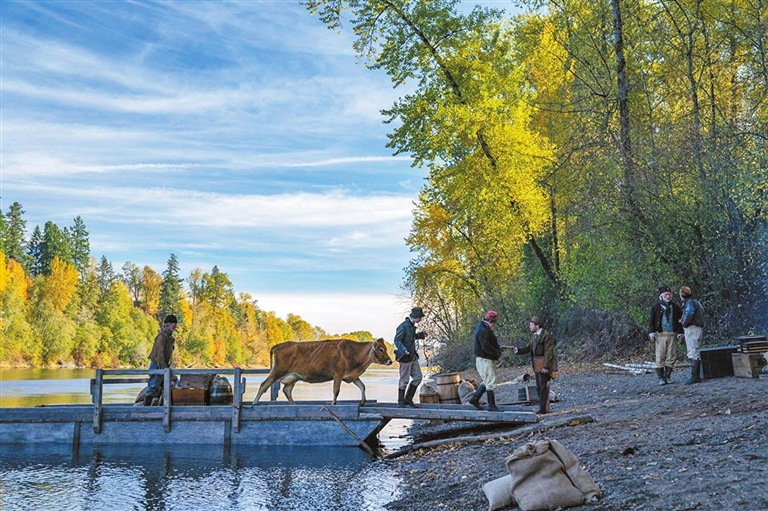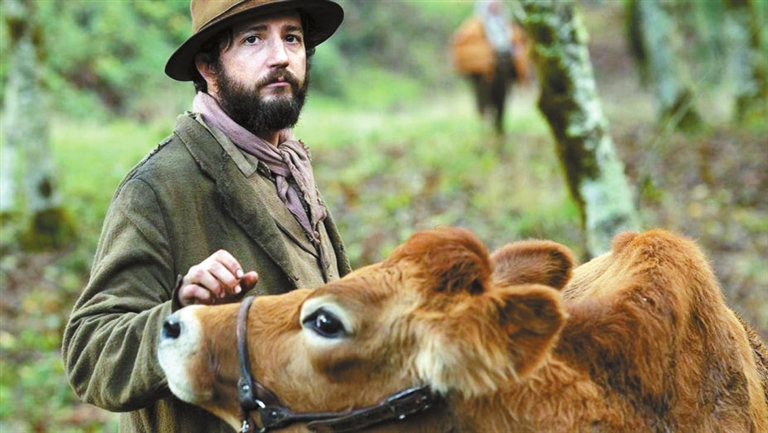

《第一头牛》 Starring: John Magaro, Orion Lee, Toby Jones, Ewen Bremner, Scott Shepherd, Gary Farmer, Lily Gladstone, Alia Shawkat, Rene Auberjonois, Jared Kasowski Director: Kelly Reichardt IN a series of gorgeous scenes that punctuate Kelly Reichardt’s quietly penetrating account of life on the Oregon Trail in the pioneer fur-trading days, a diffident baker played by John Magaro speaks in soothing tones to the placid heifer that gives “First Cow” its title, establishing mutual trust as he extracts a pail of milk from her each night. Those clandestine encounters feed the gentle rhythms of this miniaturist Western. Human connection is the principal driver, however, in this evocative portrait of male friendship and loyalty flowering in the rugged wilderness. The film is dapted from one of the parallel narrative strands in Jon Raymond’s 2004 debut novel “The Half-Life.” The book twins the 1820s story with an alternating thread, set in the 1980s, in which two teenage girls in a holdover counterculture commune outside Portland discover two skeletons buried on the property, setting in motion a mystery reaching back 160 years. The film keeps that part in a brief prologue in which a young woman (Alia Shawkat) is wandering in the woods when her dog sniffs out a human skull. First with a stick, then with her bare hands, she digs in the soft earth until she uncovers the bones of two men, lying side by side. Reichardt has no interest in the kind of conventional storytelling that requires clues and revelations building to an explicatory conclusion. Instead, she simply lays out the pieces with great sensitivity and restraint, leaving the audience to make the association between the film’s haunting final image and its almost wordless opening. Magaro plays Otis Figowitz, known as Cookie; he has signed on as cook for a party of fur-trappers whose roughneck nature and thinning provisions make the meek, soft-spoken outsider a target for abuse. We learn that Cookie lost his mother at birth and his father at a young age in Maryland and has been on the move ever since, at one time apprenticed to a baker in Boston. When Cookie first encounters King-Lu (Orion Lee), the well-spoken, clearly educated Chinese immigrant is naked and hungry, hiding in the woods from some Russians who want to kill him. Cookie doesn’t question the stranger’s version of the events that led him there; instead, he brings him food and water, and conceals him from his trapper band as they move downriver until King-Lu can get away safely. The two men meet again by chance some time later in a bar at the rustic Royal West Pacific Trading Post. King-Lu invites Cookie to his shack in the woods to share a bottle of whiskey, and the spontaneous domesticity of the scene instantly suggests the thin line separating friendship from love. The arrival of a dairy cow by boat from California into this rural backwater of new settlers is an almost surreal event. The cow belongs to the local English landowner and mercantile overseer known by his title, Chief Factor (Toby Jones), who lives with his Native American wife (Lily Gladstone) in a relatively fancy home for the time and place. Cookie, by now cohabiting with King-Lu, notes how good it would be to have some milk to make buttermilk biscuits and the business-minded Chinese man responds by simply asking what other ingredients he would require. With no further discussion shown, the pair begin making regular nocturnal forays to the pasture by the Chief Factor’s house; King-Lu keeps watch from a tree while Cookie milks the large brown cow, patting the animal’s furry flanks as she shoots an acquiescent gaze over her shoulder at him. Their first experiment selling a small batch of biscuits in the marketplace proves an instant success, with demand increasing every day as they return with more stocks. When the Chief Factor becomes an appreciative customer, wistfully sighing “I taste London” as he bites into a steaming biscuit, there’s droll humor in King-Lu’s assertion that the Englishman is too smug ever to suspect his inferiors of thievery, or even question the supposed secret Chinese ingredient that makes the “oil cakes” so tasty. Cookie gets nervous about their scheme, but King-Lu nudges him to start filling the bucket with more milk, enabling them to make more biscuits and increase their earnings — the plan being to save enough money to allow them to resettle and set up shop in San Francisco. Another filmmaker might almost have treated the biscuit business as caper comedy or played up the foreboding of tragedy. But Reichardt folds it all into an authentic depiction of the realities of pioneer life, grounded in the lovely portrait of an unlikely relationship based on mutual trust, understanding and unspoken affection. While not a lot happens in “First Cow” by the standards of most two-hour narrative films, and some may wish for a less open-ended conclusion, the drama’s rough-edged lyricism is enchanting. (SD-Agencies) | 
